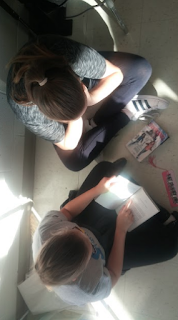We are reading the book, Iqbal, as a class. The novel is a fictional account of a very true story. With an underlying theme of
SOCIAL RESPONSIBILITY, it is important that we learn about the issues which currently exist, and how people are working together to make our world a better place.
Iqbal teaches students about child slavery in Pakistan, and how a very brave boy named Iqbal worked to change the status quo - what was currently accepted by most.
I encourage you to ask your son/daughter about what they have learned from the novel so far.
Along with learning about rug factories and the political climate which existed during this time, we are learning how to use a variety of skills to help us
UNDERSTAND what we are reading as well as
LITERARY DEVICES which authors use to help readers better understand their writing as well as make their writing more interesting.
We have completed the following activities:
Illustrator - Students drew a scene they
visualized while the book was read aloud. Students were asked to include a few sentences to explain their picture.
Word Wizard - Students found new vocabulary and practised using this vocabulary in new sentences. Students were also asked to find examples of figurative language after completing an interactive activity in the classroom!
Questioner/Discussion Director - Students learned about open-ended questions, and worked on creating questions which evoke deep and detailed answers.
Predicting - Students have used predicting to review what they know about the novel and create a skit around what they think will happen next. Predicting is an important skill for reading comprehension. Predicting can help us better understand characters and themes as we read.
Summarizer - Students have learned that summarizing is an important tool to better understand what we read as it helps us review the key points. Students completed a summary of a non-fictional article in Health class, and of a chapter in Iqbal.
In WRITING -
1) Students have learned the 5 MAIN LOOK FORS when writing a PARAGRAPH!
2) Students have reviewed EDITING PROCEDURES and understand that they are expected to review their work at least SIX times, one time for each editing criteria! Students even re-wrote their version of Little Red Riding Hood, and worked hard to create a well-edited piece!
3) Nature Sit and Write - Students went outside and found a quiet place to themselves. Students then took notes on what they saw and are learning to use DESCRIPTIVE LANGUAGE along with LITERARY DEVICES to create interesting works of writing based on their nature walk.









